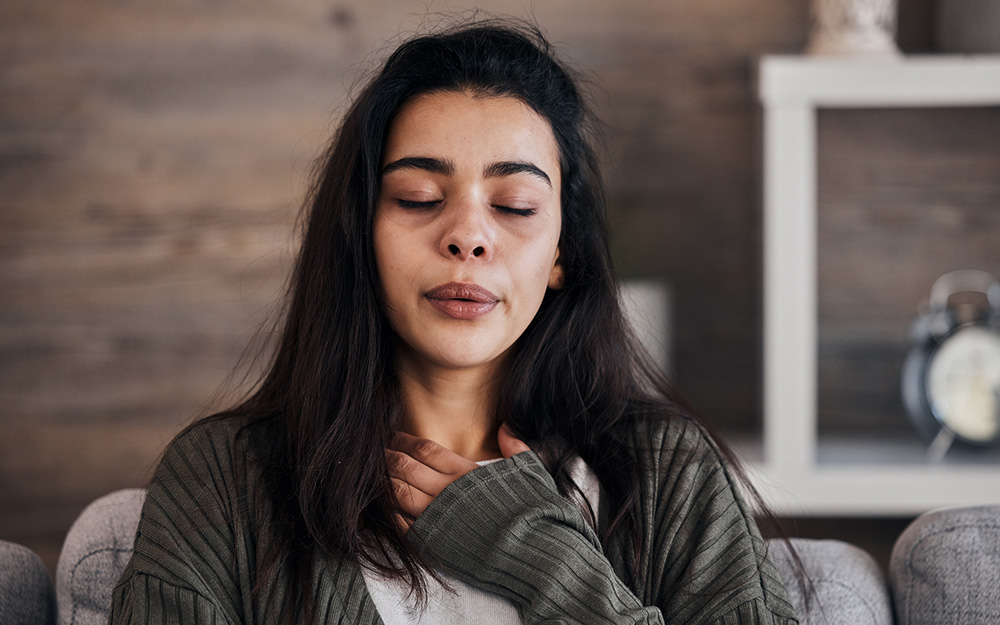This Common Heart Medication May Ease Anxiety
Date
May 2, 2025
Credits

Date
May 2, 2025
Credits
Medical providers featured in this article

In Brief
{{cta-block}}
Ever since the 1960s, medicines known as beta-blockers have been used to treat high blood pressure and other heart-health concerns. But recently they have captured social media attention as a treatment for another common issue: anxiety.
For example, beta-blockers can be especially helpful in reducing anxiety related to the stress of a job interview, work presentation or stage fright.
“Up to 60% of musicians and actors report stage fright, which probably explains why people are Googling this,” said Christopher Fitzgerald, MD, a Cedars-Sinai primary care physician who has used beta-blockers to treat anxiety. “I had to speak at the Staples Center (now called Crypto Arena) in front of 4,000 people, and I thought, ‘I’m going to need a beta-blocker.’ I don’t have an anxiety disorder and I can usually speak publicly, but 4,000 people felt different.”
{{providers}}
How Beta-Blockers Work
Doctors prescribe beta-blockers for high blood pressure, anxiety and other conditions because the medications block the actions of stress hormones that raise the heart rate.
“Whenever we’re presented with a stressor, whether it’s a tiger coming after us, a big speech we have to give, getting on an airplane or just daily anxiety, our body’s fight-or-flight response kicks in,” said Rebecca Hedrick, MD, a Cedars-Sinai psychiatrist.
The stressor, she said, triggers the release of the hormones adrenaline and noradrenaline, which “raises the heart rate, raises the blood pressure, pumps the blood extra fast and hard so that we can run away or fight.”
Beta-blockers, however, stop that process by preventing adrenaline and noradrenaline hormones from causing these stress-related changes.
Selective beta-blockers primarily affect the heart; nonselective beta-blockers have wider-reaching effects, including an impact on the brain.
“With panic attacks, phobias, performance anxiety or post-traumatic stress disorder (PTSD), the elevated heart rate and adrenaline surge start the ball in motion. Nonselective beta-blockers can turn down the volume on the body’s response so that your head is clearer and you cope better with the stressor,” Fitzgerald said.
“The fact that this is a medication typically used for cardiac issues means that it doesn’t have the stigma attached to it that anti-anxiety medication does.”
When to Use Beta-Blockers for Anxiety
Doctors prescribe propranolol, a nonselective beta-blocker, to ease symptoms of anxiety, along with panic disorder, PTSD and other behavioral health conditions. Often, it’s prescribed not for everyday use but for the occasional anxiety triggered by a stressful situation.
“Propranolol is a really good option because it works in about 20 to 30 minutes, it can be taken as needed and it doesn’t cause sedation,” Hedrick said. “Most medications that reduce anxiety that quickly cause sedation or brain fog, but if you’re going to be giving a speech, you don’t want that.”
“Since the medication is typically used for cardiac issues, it doesn’t have the stigma of anti-anxiety medications,” Hedrick said. “Often, patients say, ‘I don’t want to use psych meds,’ but when we introduce the idea of propranolol, they’re more open to it.”
However, doctors often avoid prescribing propranolol for people with diabetes, asthma or low blood pressure.
“It can cause fainting, dizziness or lightheadedness when you stand up too quickly,” Hedrick said. “It can make asthma worse, and it can mask the symptoms of low blood sugar, which could be dangerous for someone with diabetes.”
Statistics about the anxiety-reducing use of propranolol and other beta-blockers are scarce. A 2022 UK study, however, found that the use of beta-blockers to reduce anxiety more than doubled from 2008 to 2018, and it has likely increased further since then.
Taken as needed to deal with occasional stressful situations, propranolol can help a person cope.
“It’s going to turn down the volume so that your rational brain can realize that this is not a predator, you are not in danger,’” Fitzgerald said.






